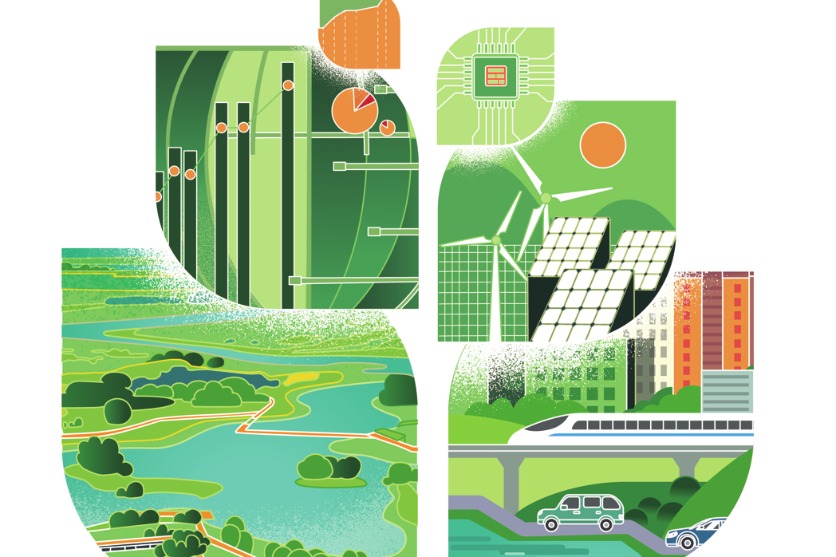Enduring friendship


China and Arab countries have a solid foundation on which to strengthen their cooperation
China and Arab countries share a time-honored traditional friendship that is built on a solid foundation. The Silk Road connected China and the Arab world in ancient times. In recent times, the two sides have supported each other in the struggle against colonialism and hegemony, and have stood in solidarity and helped each other in the course of national development.
Cooperation between the two sides in various fields has made historic leaps to a broader and deeper level. In recent years, China and Arab countries have stood together through thick and thin, setting an example for solidarity and cooperation among developing countries, and the two sides are more closely connected than ever before.
China and Arab countries have set an example in upholding mutual respect, solidarity and cooperation. The traditional friendship between the two sides has become stronger with time. Both sides firmly support each other on issues concerning each other's core interests and major concerns. China has always extended support to countries in the Middle East, solving regional security issues through solidarity and cooperation, and backing these countries in exploring their own paths of development in an independent manner.
In the wake of the visit by United States House Speaker Nancy Pelosi to China's Taiwan region, all Arab countries and the Arab League expressed their firm support for the one-China principle and for the safeguarding of China's national sovereignty and territorial integrity. The Council of Foreign Ministers of the League of Arab States has adopted resolutions on strengthening relations with China for many consecutive years, which fully reflects the profound traditional friendship and solid strategic partnership between the two sides.
In the face of persisting turbulence in the Middle East, China has always adhered to promoting peace and talks, and has put forward a five-point proposal for realizing security and stability in the region, a four-point proposal for resolving the Syrian issue, and a three-point approach for implementing the two-state solution to the Palestinian question. In doing so, China has provided feasible pathways for resolving regional hotspot issues, which have won widespread recognition and a positive response from countries in the region. China has always been committed to advancing the Palestine-Israel peace process, and the nation has repeatedly pushed the UN Security Council to review the Palestinian issue, sending out a strong voice for bringing an end to the violence.
China and Arab countries have set a good example in seeking joint development, mutual benefits and win-win cooperation. China's development has benefited from the international community, and China has also contributed to global development. In order to bring development issues back to the center of the global agenda, President Xi Jinping proposed the Global Development Initiative with the purpose of promoting global cooperation in eight key areas, including poverty alleviation, food security, pandemic response, development financing, the response to climate change and green development, the growth of the digital economy, and connectivity in the digital age. The initiative has provided a road map for solving the problem of unbalanced and inadequate development, which has won a high level of recognition and positive response from the international community. Several Arab countries, including Egypt, Saudi Arabia, Algeria, the United Arab Emirates, Qatar and Morocco, have joined the Group of Friends of the Global Development Initiative.
China and Arab countries have also set a good example for giving play to complementary strengths and promoting green cooperation. China has actively strengthened technology sharing and the transfer of technology with Arab countries in the fields of afforestation and prevention and control of land degradation and desertification. The two sides are actively promoting cooperation in the fields of solar energy, wind energy and other renewable energy, and striving to explore cooperation in the innovation of energy technology and the transformation and upgrading of their industrial structures.
China and Arab countries have set a good example for mutual learning, openness and inclusiveness. Both sides are civilizations with thousands of years of history and a fine tradition of mutual respect and treating each other as equals. Many polls in recent years have shown that the Arab people have a high level of favorable opinions of China, expressing full recognition of China's foreign policy and hope to strengthen exchanges with China, which shows a high level of public support for the China-Arab friendship. Countries including Egypt, Saudi Arabia and Bahrain have actively conducted cooperation with China over the opening of Chinese language courses. The UAE, in particular, has 142 primary and secondary schools offering Chinese language courses, and the number is expected to reach 200 in the future.
In the face of the major changes underway in the global landscape and the COVID-19 pandemic, China and Arab states should seize the historical opportunity to further strengthen their solidarity and cooperation, extend support to their respective efforts to safeguard sovereignty, security and development interests, and bring more tangible benefits to the Chinese and Arab peoples.
First, China and Arab countries should continue to intensify high-level exchanges, deepen strategic communication, and firmly support each other in taking a development path that suits their own national conditions. The two sides must uphold multilateralism, firmly safeguard the international system with the United Nations at the core and the international order based on international law, resolve differences and disputes between countries peacefully through dialogue and consultation, and jointly safeguard international fairness and justice.
Second, China and Arab countries should use the joint building of the Belt and Road and joint implementation of the Global Development Initiative as dual drivers to empower pragmatic cooperation in various fields with technological innovation. The two sides should focus on the digital economy, aviation satellites, artificial intelligence, smart cities and other emerging sectors, develop demonstration projects for high-tech industries and jointly pursue leapfrog development.
Third, China and Arab countries should adhere to a vision of common, comprehensive, cooperative and sustainable security, deepen cooperation to maintain stability and counter terrorism, and work together to address security challenges. China will continue to maintain close communication with Arab countries on the five-point initiative to achieve security and stability in the Middle East, promote the political settlement of hotspot issues, and contribute Chinese wisdom to the realization of peace and security in the region.
Fourth, China and Arab countries should continue to promote inclusive exchanges and dialogues among civilizations, strengthen cooperation in such areas as culture, education, media, tourism and health, so as to build up the public opinion foundation for China-Arab relations. China and Qatar launched a first cooperation program on the giant panda in the Middle East this year so that people from all over the world can catch a glimpse of the panda before the opening of this year's World Cup in Doha.
Fifth, China and Arab countries should uphold the concept of green development, continuously deepen exchanges and cooperation in the fields of climate change, environmental protection, energy conservation, emissions reduction, disaster prevention and mitigation, and the development of new energy and renewable energy. The two sides should step up technology transfer and sharing, improve their environmental protection and governance capabilities, and jointly promote the development of a Green Silk Road in the Middle East and contribute greater efforts to the realization of emissions reduction targets.
The author is the special envoy of the Chinese government on the Middle East issue. The author contributed this article to China Watch, a think tank powered by China Daily.
Contact the editor at editor@chinawatch.cn


































